#tony is stressed out
Explore tagged Tumblr posts
Text
Tony: *In the middle of playing hide n' seek with Peter, five hours in, on the verge of tears, unable to find him*
Peter: *sleeping peacefully on the top shelf in Tony's closet*
#peter parker#tony stark#iron dad#spiderson#tony is peter's dad#incorrect marvel quotes#incorrect quotes#peter is adorable#tony is stressed out#he stays at peter's side as he sleeps refusing to let him out of his sight again
319 notes
·
View notes
Text
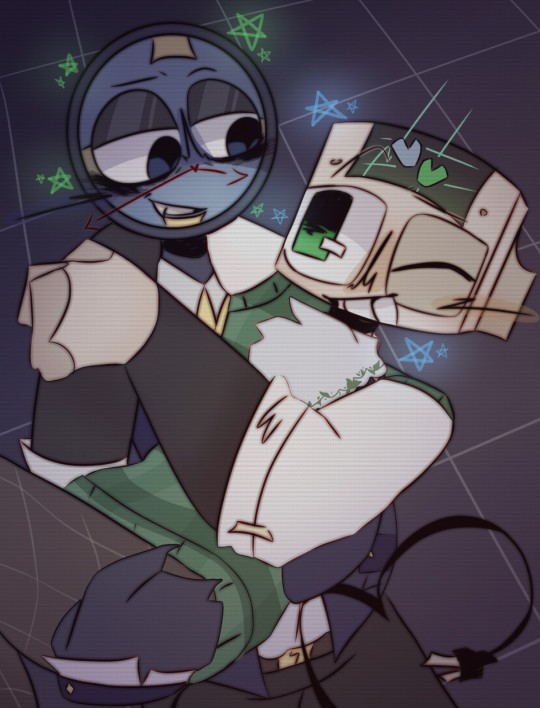
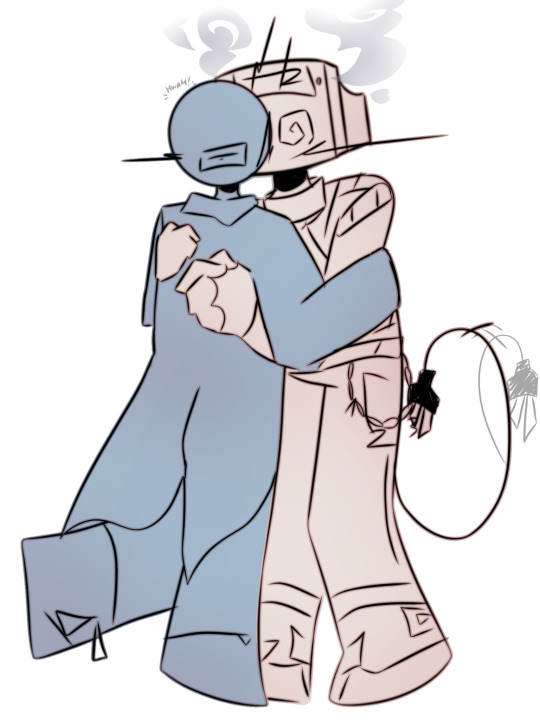

if i ever say that i dont like digitaltime . thatz not me – a skinwalker haz violently murdered me and stolen my identity – immediately seek shelter
#that last image iz basically tony in a nutshell#/j#i showed a couple of friendz my first drawing [which iz based on another one i made a while ago but i digress]#n one of them politely asked me to put christmas hatz on them#nd i did#maybe ill upload it separately ? whoz to say – dependz on whether or not i deem it tumblr worthy#az it standz . i just have some silly gay people that i wanted to show off cuz i miss them#ive kinda come to termz with the fact that the project ive been stressing about so much izn't going to be finished in time for the 25th#i guess itz just gonna have to wait until next year ... if ill even be around until then .... or . rather . if ao3 will ....#im rlly disappointed though – i managed to write 26k wordz in the span of a week in the past#but now i wazn't even able to squeeze out more than 5k in the span of like . 2 monthz#pathetic . no ?#sighhh#better luck next time ...#dhmis#dhmis art#dhmis ship#dhmis au#high voltage au#dhmis tony#tony the talking clock#dhmis hv tony#dhmis colin#colin the computer#dhmis hv colin#dhmis digital time#digitaltime#whatever . at least i managed to make thiz . right ?#thatz progress . yeah ?#yeah ...
70 notes
·
View notes
Text
I think Tony Simos is one of the most terrifying villains in an intrepid heroes seasons. I started my rewatch months ago stopped at episode 5 because I knew what was gonna happen decided to continue today and stopped again because that man just stresses me out too much. Like when you watch fh or acoc or even neverafter there is that fantasy element that kind of softens the blow like the stepmother and the nightmare king are creepy, but it's cool Kalina scared the shit out of me because she was giving sleep paralysis demon but I could still just go she's not real. That guy tho is truly just a man, a manipulative as fuck red pilled "alpha" male. As much as the grand themes of capitalism are also realistic and scary because of the world we live in. That guy to me for some reason trumps all of it, because you know that man he's not Robert Moses who you see from far away and who you're only gonna meet in specific settings. He's your neighbor, the dude you meet a few times that seems like a cool guy but actually isn't (him with jj) and then your friend's weird boyfriend that fucks up her car after she breaks up with him. He's not an abstract he's real. That one scene of him snapping and yelling at Sofia that pure venom fully trumps any other moment that has ever scared me in a d20 ih season. He also just annoys the shit out of me.
#dimension 20#d20#d20 spoilers#idk if that's spoilers#tony simos#the unsleeping city 2#tuc 2#I'm saying ih because ngl Aabria had some fucked bbegs#like acoc stresses me out as a whole and it's heart breaking#which is why i don't think i could rewatch#neverafter is the “horror” season but even then yeah it's fairytale shit#sofia bicicleta
53 notes
·
View notes
Text
i do still think it's like. absolutely unhinged that tony's parents died in a car accident and he still drives like he does
#buddy YOUUUU may be a racecar driver extraordinaire but the people you are weaving around are NOT also SLOW DOWN#the classic tony stark ''i'm scared of this thing lets fly directly at it'' approach. stellar#kayvswords#tbd#okay tony you're a better driver than drunk howard you've proven yourself you're like 41 you dont have 2 be going so fast always#adrenaline junkie idiot man. reckless giggly speed demon. i hate him#this complaint brought to you by the slow and careful drivers' association. IT STRESSES ME OUT
75 notes
·
View notes
Text
Squinting intensely at Will as he says that after thousands and thousands of years the bigfoot world suddenly looks like the 1950s (albeit like the Jetsons version). Mr. Campos that's a rather suspicious thing to say paired with that other suspicious thing people picked up on you saying in episode 1. You know, this:

🤨 Anything you want to share with the class, Will?
#HMMMMMM...... Plus the allusion to the hole in the stars people also pointed out... Plus everything Kelsey said comparing both worlds...#dndads#the peachyville horror#it's increasingly suspicious anyways. curiouser aaaand curiouser#dungeons and daddies#Yeah I finally listened to the episode lol#(been busy! and stressed! I started a job literally uh yesterday! got my fingerprints taken today??)#but yeah the ep was alright lol this one and last one left me wanting more for sure but still some good gags in there#Also the sound design was a lot of fun and I'm not just saying that cause I love electroswing I swear#But yeah I mean I'm blanking on other examples of this from previous seasons but ig it's like#Sometimes it's really funny when they avoid the ''dungeon'' but other times it just gets a bit boring#Same with choosing to interact vs not interact with the NPCs ig#(For example I stand by S2's biggest downfall ultimately being too little interactions/engagement with the kiddads)#So ah yeah lol#But like I said still some very good bits in there. I mean some episodes are gonna be stronger than others that's just how it is lol#Unrelated I'm a big fan of the ghost of Tony Collette momentarily making Blake italian#+ haunting the narrative with his theoretical physics thing which I totally forgot about sjjsksks so silly
49 notes
·
View notes
Text
i basically have tomorrow to draw up the storyboard for a 14 page comic for a lit journal, edit a full photoshoot, and do some poster/socmed templates based on those photos, bc i have made bad life choices and need to whack all these things out before i travel. in my defense i've delegated everything i possibly can, including a full website and the art for it (though i'm liaising between the two), and half the things i've delegated are landing on people who are doing exams while i'm out of town so they can wait anyway. in not my defense, the photos were taken last year and i forgot which sd card or hard drive they were even on
#tony muses#as i just told someone else my ability to create ebbs and flows like the tides except motivated by stress instead of gravity i guess#and that's fine but also i'm currently so worn down by matt stuff and local left infighting stuff and my current medical stuff#and fucking. ptsd! bc turns out you can just keep unlocking more traumas to recover from!#anyway i am making SOME headway on the comic (in that i have a page count now) but now i'm doubting my ability to draw again#so many possibilities for how this could look and i want it to be good
14 notes
·
View notes
Text
Everyone being sad about BTSV possibly being delayed
I'm over here thinking: good, good they can look at the amount of ao3 fics for Miguel and scrap any ideas that have him dying in next movie
#miguel o'hara#im gonna be stressed about that till the movie comes out#i still havent been able to look at mcu after tony#i dont want a repeat#spiderman across the spiderverse#miguel ohara#atsv
20 notes
·
View notes
Text
its so funny watching the 1st season of the sopranos ur like "oh boy what a cool show i cant wait to see my good relatable buddy tony do some morally dubious shit and still like him after" but by the time u reach season 5 you start every episode like this

#the sopranos#its a great show but like its not fun. its not a fun show.#its a sit down and be stressed out for an hour show#i LIKED tony b why did he have to do all that shit
6 notes
·
View notes
Text
Let's stay positive at least Jamie didn't lose to Saraya
#everyone was stressing me out with the predictions that saraya vs jamie was happening at all in#at least its toni and we know she's gonna have a great reign#jamie hayter#aew double or nothing#aew#aew lb
19 notes
·
View notes
Text
My apologies for being absent!
/cracks knuckles, but I'm in the midst of typing about fear and with it, hope to make it up to you guys a little. I don't remember the last time that I've been so motivated to write meta of any kind, but Kafka makes me never want to shut up, and honestly— I feel bad when I'm sitting in Discord, with someone's DMs open and I'm sitting on my hands to prevent myself from hypothesizing, because when I don't, it's twelve paragraphs at least. So here we go, let's take my hypothesizing to the dashboard.
Can I also just... say how much two instrumental tracks scream Kafka to me and I lose my mind? I need to stop losing my mind. But this character is just everything I've craved to write for much too long, her premise, dynamics, her goal, the references and symbolism, it's so delightful and thrilling and absolute chef's kiss. Any way, in case anyone may want to know what's playing over and over and over again without stop. The romanticism of Kafka: — Table for Two — The Field
#[ ooc. ] don't try to make it logical or edit your soul according to the fashion. rather; follow your most intense obsessions mercilessly.#[ the difficult thing is that i have this feeling like i always need to be more coherent on the dashboard and sometimes certain... ]#[ 'mid-thought' ... thoughts get lost. not in translation but my head is like tony stark. 50000 thoughts at the same time. ]#[ when those little cogs of this little human being that is me start going at a million miles an hour. ]#[ and i can't write them all down in a tumblr post-- or maybe i could. perhaps i should just have a 'read more' section... ]#[ and just dump the random thoughts there if they're still there when i'm done typing or as i'm typing. ]#[ we'll see. that may actually be a really good idea of me. oh my gosh look at that. I STILL FUNCTION. ]#[ the heatwave didn't ruin me entirely. ]#[ also i'm learning to use a pressure cooker and i swear i can hear the light sound from here and i just worry-- ]#[ this thing is going to explode any minute and every minute even if it isn't. ]#[ i'm not by default or by nature an anxious individual but jesus. ]#[ this thing stresses me out. 8 MORE MINS; GOD. please hold on. 😭 ]#[ okay okay-- abel korzeniowski and i are gonna continue. see you on the flipside in like 6 hours. ]
5 notes
·
View notes
Text
“More than usual” does he average 3 ?
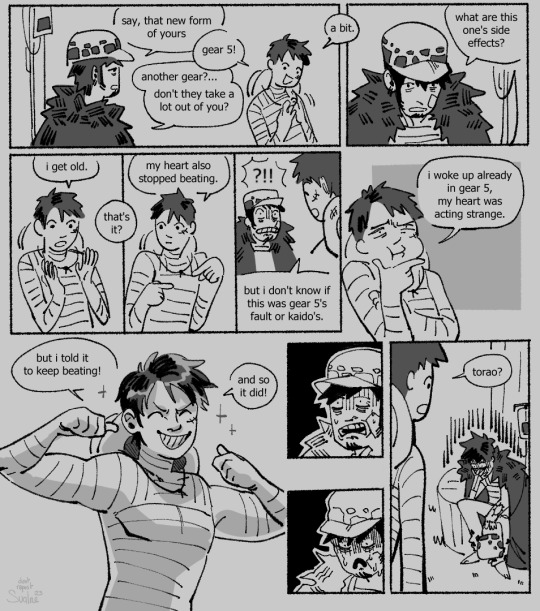
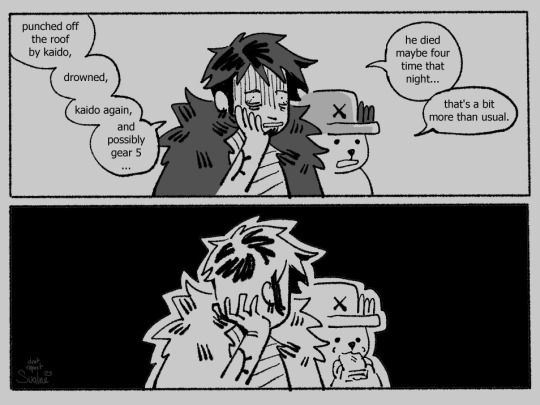
he's fiiiiine.
#one piece#monkey d. luffy#trafalgar law#tony tony chopper#one piece spoilers#one piece art#funniest shit ever#real#honestly so so real#keep stressing law out please its funny
17K notes
·
View notes
Text
Lillie is a very anxious girl and hates change. As the week and few days wore on after Toni got spayed Lillie started to get more stressed, less interested in her food and more and more agitated as it went on without her seeing Toni
Today, when Lillie saw Toni today she shook and you could see the stress fall off and now she is completely back to her normal self
#she and Toni eat together#it was getting to the point at meal time Lillie was running around the room where we feed them#she actually asked for dinner tonight#where she has stopped asking the past few days#she would eat but just wasnt thrilled#and then would run around angrily#she knew Toni was in the house but hated everything about her being spayed#after Lillie shook off her stress she went and jumped Toni to play#she really hated her being locked up#timmy was the second most unhappy#he just hung out by the door with his ears back#Grayson takes his cues from Gigi and shes so smart she wasn't even a little stressed about what was going on#If Gigi is upset Grayson is upset if Gigi is happy Grayson is happy#it's very cute#now Toni Grayson and Gigi are playing together#personal#so i have cats and a dog#toni#lillie
1 note
·
View note
Note
just want you to know i really appreciate the insight you give *but* i did start following you for your mountain goats url.
thanks for being so outspoken about this though, it means the world.
i have been listening to bleed out so much in the last few days you have no idea
#thank you... my stress eye twitch and jaw tension is so fucking back and i had four hours of sleep#but i'm doing my best and i hope everyone else affected by this is taking care of themselves too#if you're an a11n or ex a11n reading this and you want to reach out please do. there's an ex a11n slack and more generally#i want to be here for you. i know things were so bad for so many of us#tony answers
17 notes
·
View notes
Text
Stony is my OTP, but I'm rewatching IM1 and I'm giggling and grinning over the Pepperony scenes 🥰
1 note
·
View note
Text
Tony obviously realized that Juice coming out to the Bullet Club theme gave us immediate anxiety and fixed that
#i feel less stressed out seeing juice tonight#what a miracle tbh#juice robinson#tony khan#aew#aew lb
8 notes
·
View notes
Text
Подарок. | W.S

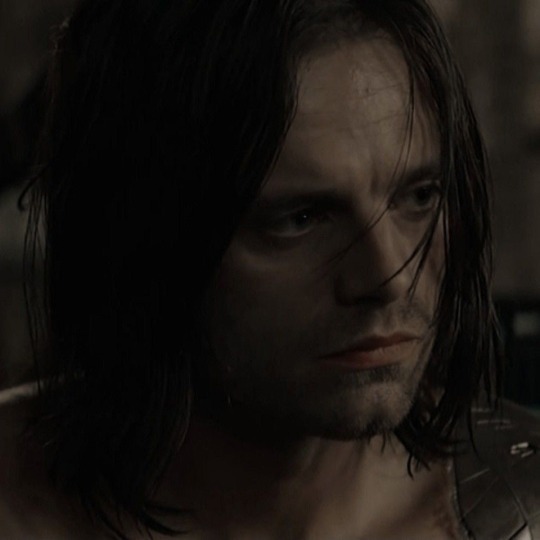

summary: You give the soldier a present for Christmas.

warnings: Fluff & Angst | Fem!reader | Winter Soldier!Bucky | Post!CA:TWS | PTSD mentions | Mention of medical treatments | Recovery | Brief talk of nightmares
a/n: Sort of unofficial part two to Sugar Plums since I had a few people asking for a part two. Same universe I guess, with some time between. Uhh probably rushed idk. To be edited later. ;; wc: 3.3k

Recovery.
Fickle, fragile, exhausting.
He gradually accepted being called Bucky, though the name stirred something uncomfortable within him each time it reached his ears. Steve, ever persistent and hopeful, would use various versions of the name - Bucky, Buck, or sometimes James - in his unwavering attempts to resurrect the friend he once knew, unable to accept that the Bucky from his memories had faded away like footprints in snow.
Winter had completely erased the old Bucky.
While these names would trigger a subtle internal struggle, he maintained an almost perfect mask of indifference, with only the slightest furrowing of his brow betraying any sign of his inner turmoil.
You, however, carefully navigated between calling him Bucky and Soldat, aware that using his old code name might reinforce programming you wished to help him break free from. Yet there was a slight relaxation in his shoulders when you used the familiar designation, the way it seemed to ease the constant tension he carried made it impossible to completely abandon - his comfort, however small, had become your priority.
Even if that comfort stemmed from a dehumanizing name.
It required negotiation and persistent discussions to convince Tony to finally allow the soldier access to the medbay wing for his necessary medical treatments. Despite the soldier's extended stay in the tower passing without any concerning incidents, Tony maintained a strong hesitation about providing medical assistance. His deeply-rooted skepticism and apparent distrust were sources of frustration for you, though you consciously chose to avoid escalating the situation into a full-blown argument, knowing it would only make matters more complicated.
You had already gotten into intense scuffles with Tony over the soldier’s stay, how he needed to be looked over, physically and internally. The dislocated arm Steve caused never healed, and he had been carrying his arm awkwardly close to his body. Other physical injuries on top of the apparent dehydration and malnourishment, he was constantly under a veil of sickness.
The situation was particularly delicate because Soldat struggled with being in the presence of the other tower residents. He was acutely aware of how everyone seemed to cautiously moderate their behavior around him, treating each interaction as if they were navigating through a minefield of potential triggers. Like they were walking along eggshells every time they were near him.
It felt like he was walking on glass.
You were his only source of comfort, though traces of caution still lingered in his demeanor. He knew you posed no threat to his wellbeing. You had been patient and gentle the entire time, regardless of his panic or prone sense to lash out if he got stressed enough.
Long nights stretched endlessly in the sterile medbay rooms, where you faithfully maintained your vigil in the uncomfortable chair positioned beside the standard-issue medical bed. The soldier’s bed remained empty, as he consistently chose to rest on the cold floor instead. Sleep was an elusive companion for him, a nightly battle he rarely won. More often than not, his rest was violently interrupted by his own terrified screams or desperate shouts, his body jerking upright with defensive movements, arms swinging at invisible threats.
You would spend countless minutes trying everything in your power to bring him back to reality and calm his frantic state. Sometimes, despite your best efforts and gentle words, the situation would escalate beyond your ability to manage, forcing the medical staff on standby to intervene with sedatives to prevent him from unintentionally causing harm during these episodes.
Luckily his recovery progressed slowly but surely, transitioning from those intensive IV treatments in the clinical environment of the medbay to the more comfortable setting of your personal quarters. His sleeping arrangements evolved as gradually as his treatment; first from the hard floor, then to the modest couch tucked against the far wall, and finally to your bed.
These days, he found his rest beside you each night, his body instinctively seeking comfort by curling close to yours, desperately trying to make up for all those decades of disturbed sleep and haunted dreams.
Over time, his attachment to you had grown increasingly intense, and he began experiencing waves of jealousy whenever your attention was directed elsewhere. You helped around the tower a lot, so you tended to be distracted with tasks or aiding in another’s need. The soldier didn’t like it, so he began leaving his mark on you. It started subtly at first, he would rub your clothes on himself, in his mind it was good enough that you smelled like him. He saw it in a documentary once, of animals, but he had been in such a dehumanized state for so long, it made sense to him. His body’s scent on you, others would back off. That would work.
But, no, it wasn’t enough.
One day, crossing an unspoken boundary between you, he started placing love bites along your skin, positioning these tender marks from your neck down to your shoulders, eventually becoming bold enough to venture lower, marking your chest with these plum bruises.
The possessive displays sent warmth coursing through your body, and you willingly accepted his territorial behavior. After all, you had become his sole source of comfort and security in this world, making it perfectly natural for him to want to claim you in some way - whether through his distinctive scent (you knew about him rubbing your clothes on his body) or these carefully placed marks. His need to establish this connection, to make his claim visible, he was terrified you’d be taken from him.
Progress was being made in your relationship.
While he was still cautious with physical contact, he had begun to allow gentle touches and brief moments of closeness, though always within carefully maintained boundaries. He was like a cat, deciding when he wanted physical attention and when he wanted it to stop. The challenge of memory recovery remained a significant hurdle in his healing process. You had to help him remember specific things, he often mixed Russian and English, or plainly forgot the simplest of words.
He couldn’t for the life of him remember what a pillow was.
When Steve would speak to him, sharing stories and memories of their past, Bucky would often find himself lost in confusion, unable to connect with the vivid recollections that Steve so enthusiastically shared. The determination in Steve's eyes was evident as he tried desperately to help his lost friend remember the bond they once shared, but for Bucky, these memories remained frustratingly out of reach.
Steve's enthusiasm was well-intentioned, but sometimes, it manifested as an overwhelming flood of information and expectations. You could sense Bucky's growing distress during these interactions, the way his shoulders would tense, how his eyes would dart anxiously around the room. The stark reality was that Bucky's memories of Steve were minimal at best, yet Steve continued to share detailed accounts of their past experiences with increasing intensity.
Your became a careful mediator, providing emotional support to Bucky while gently helping Steve understand that his passionate approach was more hindering rather than helping the delicate process of memory recovery.
Bucky would get frustrated with himself during his journey of recovery. His collection of journals became a sanctuary for his fragmented memories, filled with carefully preserved photographs (provided by Steve), detailed notes written in an unsteady hand, and hastily scrawled thoughts or recollections that would suddenly surface from the depths of his consciousness throughout all hours of the day and night. These journals became both a source of comfort and torment, evidence of his struggle to piece himself back together like a puzzle without a photo.
Even with help from you or Steve, he maintained strict control over his recovery process. He deliberately chose not to document anything that Steve mentioned or tried to convince him of, instead focusing solely on recording memories that emerged organically from within his own mind.
Having experienced decades of mental manipulation, he didn’t want anyone influencing his thoughts or memories ever again. He couldn't bring himself to simply accept Steve's version of events without questioning them, needing to verify everything through his own recollections.
You knew it hurt Steve to see Bucky this way, how he refused to listen or believe him, but you couldn’t blame the man. Either of them, really. It was delicate, it took a lot of patience on everyone’s part.
Bucky’s dedication to recovering his past manifested in sleepless marathons that would stretch on for days at a time. The soldier within him approached the task with military precision, attempting to reconstruct his shattered memories in a specific manner. Yet despite his efforts, the majority of his recollections remained disjointed and fractured, with memories of his time with HYDRA dominating his consciousness more than anything else.
While Bucky was trying to recall his elusive past, you dedicated yourself to helping him build new neural pathways and retain more recent experiences, hoping to make his daily life more manageable and give him a sense of independence. The simplest tasks had become foreign territory for him - the muscle memory and basic understanding of everyday activities having slipped away like water through cupped hands. Modern appliances like microwaves, coffee makers, or the oven had become objects that he approached with confusion.
His relationship with food had become particularly concerning. Unable to prepare proper meals, you would find him furtively consuming makeshift sandwiches, but only when he believed he could finish them before being discovered. His posture during meals was hunched, protectively positioning himself over his plate or bowl, shoveling food into his mouth at an alarming pace, his entire body tense as though preparing to defend his meal from unseen threats.
Food aggression, apparently, wasn't restrictive to just animals.
Among the numerous concerns, his recurring nightmares stood out as the most troubling and pressing issue. The frequency and intensity of these night terrors had become increasingly worrisome, regardless of how well he had progressed otherwise.
Night after night, his anguished screams would pierce the darkness, and these episodes gradually evolved into extended periods where sleep became completely impossible for him to achieve. Bucky would remain awake for days and nights at a stretch, fighting against his own exhaustion, scribbling nonsense into his journals until his body would finally surrender and he would collapse into a brief, troubled slumber.
This cycle would repeat, each time more severe than the last.
Your began looking into different methods that might help ease his troubled sleep so that Bucky could experience the simple luxury of peaceful rest. Your research led you through a wide array of options; from various herbal teas and natural sleep remedies to more conventional medical interventions. However, given his strong aversion to pharmaceutical solutions, you deliberately steered clear of medication-based approaches, knowing they would likely be met with resistance.
Over time, you discovered that a soothing routine of warm herbal tea and gentle companionship proved to be an effective remedy for his nightmares. The nightly ritual of sharing your sleeping space had become second nature, and you observed how this consistent presence brought him the comfort and stability his life lacked for seven decades. His sleep patterns were delicately intertwined with his emotional state, thus during periods of anxiety or perceived threat, his rest would become noticeably disturbed and fitful.
However, your unwavering presence served as a constant source of reassurance, creating a safe haven where he could finally find peaceful rest. Plus, it helped him regain new memories to write down and you could see how proud he was every time he recounted something from his past.

Christmas morning.
Every corner and crevice of the tower sparkled with festive décor, tinsel draped from every available surface, and twinkling lights illuminated the halls in a dazzling display. It was an extravagant winter wonderland that bordered on excessive, but that was exactly Tony's style - he approached every holiday with unbridled enthusiasm, and Christmas was undoubtedly his crowning achievement.
With his seemingly limitless resources at his disposal, there was nothing holding him back from creating the most elaborate celebrations possible.
Aka…he was rich so he could.
In contrast to Tony's lavish approach, you took a more modest approach when it came to gift-giving. The act of receiving presents always made you somewhat uncomfortable, as you found far more joy in being the one doing the giving. You selected meaningful presents for each team member, carefully considering their individual interests and preferences. You couldn't match Tony's extravagant spending (something he never failed to remind everyone of that morning), but you firmly believed that the genuine thought and personal consideration behind a gift carried far more significance than its monetary value (Tony disagrees).
Bucky perched uncomfortably at the far end of the plush couch, his posture tense and rigid while the other team members enthusiastically tore through their wrapped presents with childlike excitement. Your general annoyance with Tony's characteristic swagger and showmanship failed you this morning, a warmth spread through your chest at the genuine joy radiating from Pepper's face when she discovered the exquisite diamond ring he had carefully selected for her and presented after she freed it from the tight wrapping paper.
You stayed by Bucky all morning, carefully observing his reactions to the bustling holiday atmosphere. It was clear he was struggling to process the overwhelming sensory experience and you didn’t blame him. The twinkling lights and shimmering tinsel to the constant chatter and laughter of the group, on top of holiday music and the smells of breakfast and baked goods from the kitchen, were surely a lot to process. His discomfort grew and you recognized the telltale signs of sensory overload in his slightly widened eyes and shallow breathing. The social expectations was clearly taking its toll.
He had wanted to try, he wanted to sit down with you that morning, but he had been struggling.
Your gift pile was modest, exactly as you had requested. You insisted that presents weren't necessary, you found yourself the recipient of a generously stuffed Christmas stocking and an assortment of small, meaningful items carefully chosen by your teammates in a way that made it impossible for you to object to their kindness.
When Steve presented Bucky with a collection of carefully preserved mementos from their past, but the soldier's response wasn’t what he wanted. His eyes fixed on the items that should have sparked recognition, should have ignited memories of happier times, but instead were met with blank confusion and growing distress. You sensed the uncomfortable scene and noticed the mounting anxiety in Bucky's expression, you decided to intervene with a present you got for him.
"Here, I got this for you." You handed him a carefully wrapped bag with delicate tissue paper peeking out from the top, rustling softly with each movement. "Nothing all that special but...I figured it might be nice to have something like this." You replied gently, your voice carrying a hint of nervousness as you watched him, waiting with anticipation for him to open the gift.
Bucky held the bag tentatively, his eyes fixed on the festive baby blue packaging adorned with an intricate pattern of darker blue ornaments. The glitter-coated decorations caught the light as they spiraled across the surface of the bag. He had to blink a few times to refocus his eyes, his hand slowly reached up and grasped the white tissue paper that had been carefully arranged at the top, concealing the gift. He pulled it free, soft crinkling sounded as he removed it.
He reached into the depths of the bag, his fingers brushing against something soft before grasping it. As he drew it out, his hand revealed a charming stuffed elephant, its plush grey body soft to the touch. The toy was perfectly proportioned, with endearing fat limbs that dangled naturally from its tear-shaped body. Its oversized ears flopped gently and its trunk curved in a friendly manner that seemed to welcome embrace. The stuffed animal sat comfortably in his hands, sized just right for holding close and cuddling.
"Elephants are known for their memories, you know." You gave him a gentle, encouraging nudge, your voice soft and hopeful. "Who knows? Maybe having this elephant around will help spark some of those lost memories of yours. They say elephants never forget, after all."
Bucky turned to face you, his expression one of confusion and curiosity. His eyes held that familiar, guarded look the soldier usually carried - a careful blend of wariness and interest that never quite revealed his inner thoughts. He examined the stuffed toy with an almost childlike fascination, as if encountering one for the first time.
His flesh hand explored every detail of the plush elephant with careful attention, fingers trailing along the soft fabric. He wrapped them around the trunk, testing its flexibility, then moved to rub the floppy ears between his thumb and forefinger, then squeezing the body gently as if checking its softness.
"There's something else too." You smiled warmly, gesturing toward the bag with enthusiasm. "Go ahead, take another look." He complied, reaching in until his hand emerged clutching a brand new journal. Following the theme, the journal was decorated in a soothing light blue shade, its cover stamped with a delicately printed elephant in the center. "I noticed your other journals were getting pretty full, so I thought you might need a fresh start. This one's got plenty of space, lots of room for all those thoughts and memories you want to keep safe."
His hands gently set the items down after examining each one carefully, his eyes lingering on every detail as if trying to memorize them. Then he turned to you, his expression unreadable. "You...got these...for me." Bucky spoke slowly, each word carefully chosen, as if he was having trouble processing the simple act of kindness. "To help me remember?"
"And, the elephant will be a nice cuddle buddy for those long nights you tend to have," you explained softly, watching his reaction. "It has special infusions of lavender and bergamot oils that I picked specifically to help you sleep better. The aromatherapy might even help soothe away those bad dreams you've been having. Well, at least according to the sales clerk." You reached out and lifted the soft plush elephant, bringing it to your nose and inhaling deeply. "See? It's really calming, isn't it?"
He took the toy back and smelled it deeply, letting out a contented sigh as the aroma filled his nose and sent waves of comfort through his body, making him feel warm and fuzzy inside. He carefully lowered the elephant into his lap, treating it as if it were made of delicate porcelain. His throat tightened with emotion as he swallowed hard and looked back at you, his eyes wide with disbelief and gratitude.
"All this for me?" he whispered, his voice barely audible as he struggled to process the reality that someone would think to get him anything at all (Steve didn’t count). The concept of receiving gifts was so foreign to him, so far removed from his perception of what he deserved, that he could barely wrap his mind around it.
You thought maybe it looked sill to some people, but it was more about why you got it, not what you got him.
You nodded, offering a warm smile, "Yes...I got this just for you."
The soldier's gaze slowly drifted back to his lap, his fingers lingering momentarily on the thoughtful gifts before carefully pushing the journal and elephant to rest beside him. He then leaned forward quickly, closing the distance between you and wrapping his arms around you in a tight embrace. The display caught you off guard, given his usual hesitance to initiate any form of contact beyond nightly cuddling or his possessive love-bites.
After you recovered from the sudden gesture, your arms encircled him in return. You drew him closer as he nestled himself against your body, seeking comfort in your warmth and smell. It was one of the only things he could consistently rely on.
A knowing smile played across your lips as you whispered against his ear, "I take it you like it?"
"...Да."

Thanks for reading. -em 🌿
Dividers by @/strangergraphics | Images found on Pinterest.
#bucky barnes#bucky barnes x reader#bucky barnes x you#james buchanan barnes#james buchanan barnes x reader#winter soldier#winter soldier x you#the winter soldier#the winter soldier x reader#the winter soldier x you#bucky barnes fluff#bucky barnes oneshot#bucky barnes fanfic#winter soldier x reader#winter soldier fanfic#emwrites🌿
2K notes
·
View notes